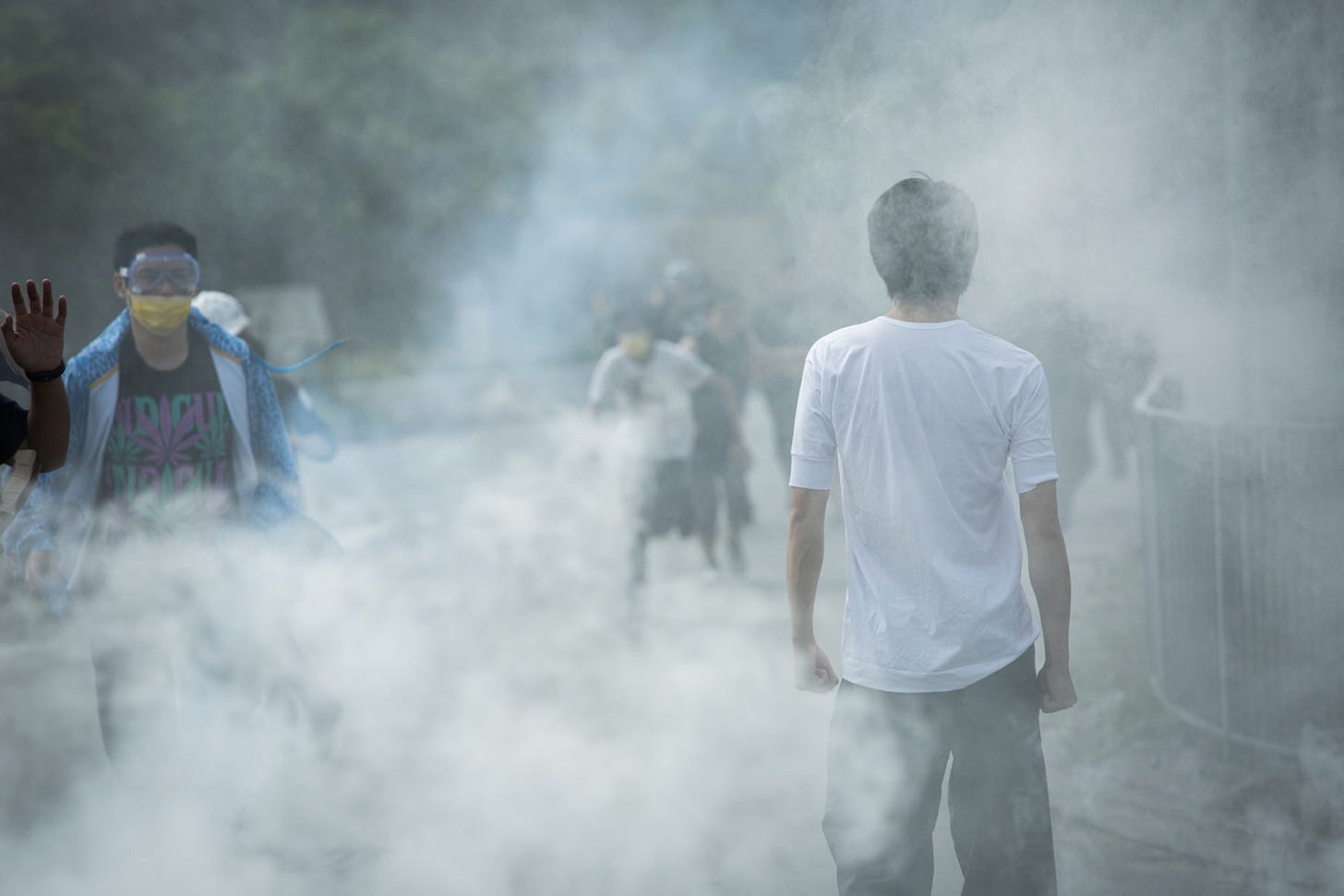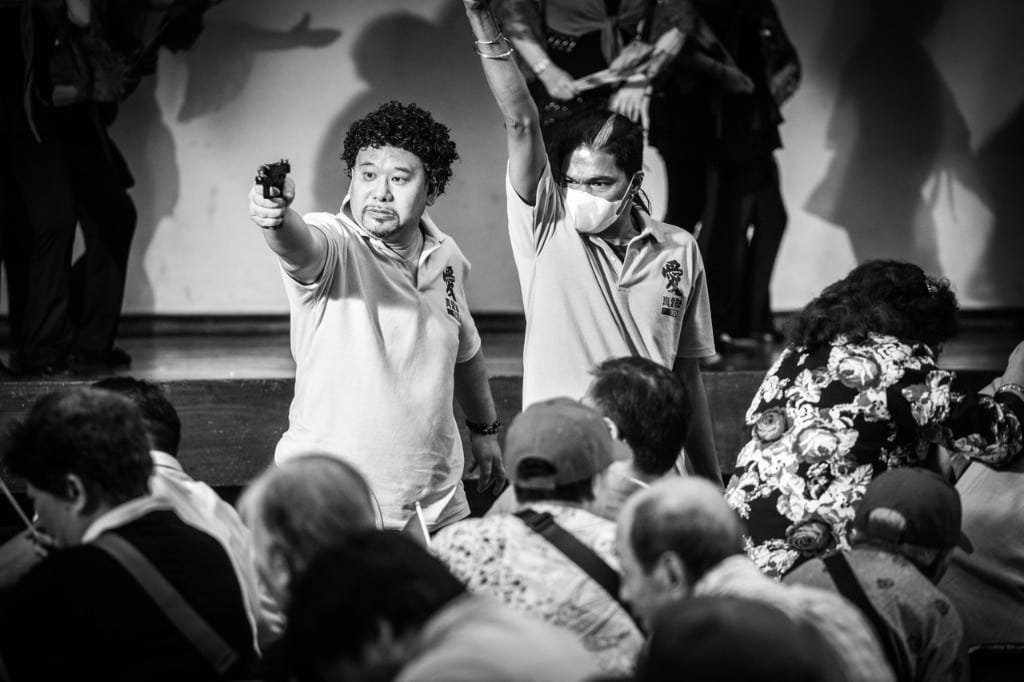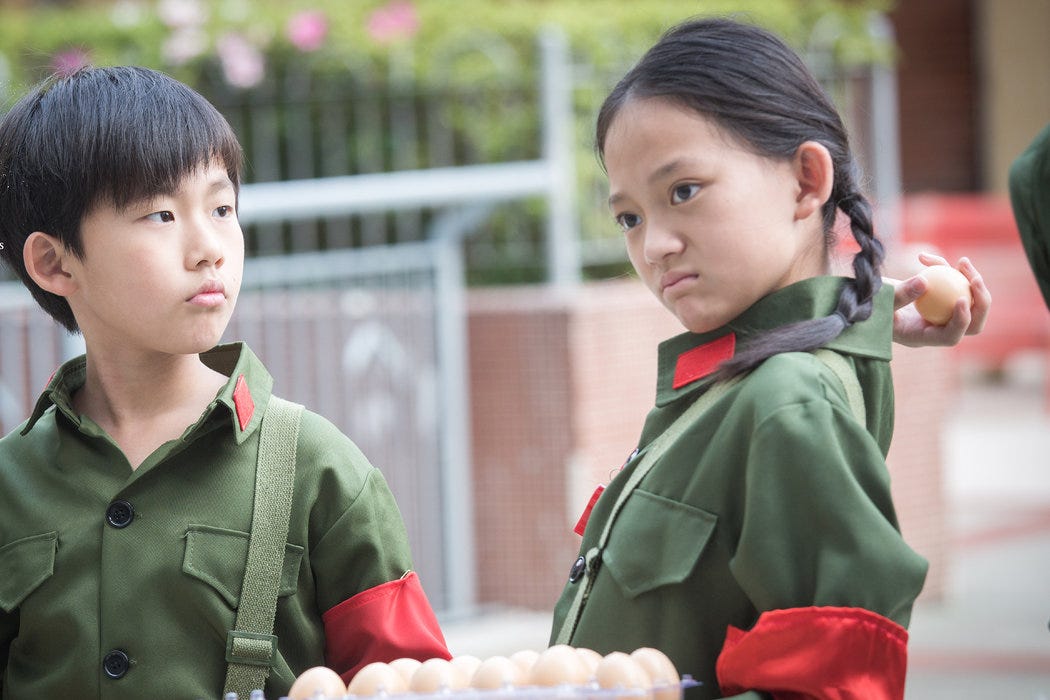《十年》,十年:如何解读香港命运的预言?
Ten Years After "Ten Years": How Should We Read Hong Kong’s Prophecy?
作者:浮蝉
By Fu Chan
The English translation follows below.
1
2025年的香港,平静的外表下隐藏着沧桑巨变。在经历了“反送中”、新冠疫情、港区国安法、“爱国者治港”、基本法二十三条立法过后,人们印象中开放、自由的香港,似乎已与我们渐行渐远。曾被称为香港未来“预言书”的独立电影《十年》,也将迎来它诞生的十周年。
《十年》由五部短片——《浮瓜》、《冬蝉》、《方言》、《自焚者》、《本地蛋》集合而成。五部短片虽然独立,但都是对香港“十年”后情景的想象。《十年》于2015年末上映,所以电影预言的“十年”后也就是今年——2025年。可以说,因这样一部电影,2025年注定成为香港历史上一个避不开的参照点。
2015年是雨伞运动后的一年,所以《十年》既是一部作品,也是一场行动。这场行动在2015年,想象、预演十年后的香港——这种想象甚至可以关联到香港2019年的社会运动,因为影片中的想象对于投入社会运动的香港人来说等同于真实,等同于现实。这种想象和预演是为了创造另一种现实的可能,尽管到了2025年,电影中的许多想象变成了现实。
《十年》,在2015年,似乎有着反乌托邦式的夸张与荒诞,而在2020年港区国安法通过后,竟又显得有些保守、天真。
影片传达出的荒诞,也许是2015年很多观众共通的感受,甚至创作者们也故意强调了荒诞感——影片开头黑色屏幕上打出“电影情节纯属个人创作”和“本故事纯属虚构,如有雷同实属巧合”的字幕。与此同时,影片中的作者性、虚构性有所隐退,呈现出互相冲突取消的虚构性和现实感。于是,影片把虚构抑或真实,想象抑或记录,交给了观众自己选择。
所以,一个了解、身处香港现实的人,会觉得虚构的《十年》比现实的纪录片还要真实;而隔岸观火的,可能会觉得它“完全荒诞”、“宣扬绝望”(《环球时报》评论《十年》的用词)。
来到2025年再看《十年》,当想象成为了现实,我们才更直观地体会到,这部影片“荒诞”在哪里——本片之所以“荒诞”,不是因为它使用的创作技巧夸张,扭曲了真正的现实,而正是因为它自称的“虚构”,却成为了人们正在生存于其中的现实。
这种荒诞并不是艺术或文学的想象,而是源自于现实本身。对于生活在中国大陆的很多人来说,这种现实的荒诞感,也许已经成为习惯的生存处境(如新冠疫情管控下的种种荒谬)。而对于香港来说,这种荒诞是全新的、露骨的,也是尖锐和凌厉的。或许正因如此,《十年》的创作者们因为对香港的危机有着更敏锐、更前瞻的洞察,才能构建出对当时大部分人来说还属于虚构的现实。这种洞察,准确地判断了香港政治的走向,并勾勒出香港在十年后——2025年——失去自由后的轮廓。
2
(以下介绍,只含微量剧透。)
香港政治最激烈的一面,要属街头的抗争与强权的镇压。《自焚者》的灵感,来源于2014年的雨伞运动,但短片以更为激进的“香港独立”思潮为切入点,仿佛创作者早已预料到,在威权统治下,会有越来越多香港人倾向于更为激烈的抗争。在2020年港区国安法生效前,“香港独立,唯一出路”也确实一度成为香港人示威的高频口号。随着国安法的到来,只是说出那八字的口号,都要因言获罪,难免牢狱之灾。《自焚者》中短暂的催泪烟中警察镇压的场景,在今天让人首先想到已不是2014的雨伞运动,而是2019的“反送中”。而“自焚者”本身——即为抗议香港政治黑暗而献身的人——也随着香港青年梁凌杰于2019年6月15日的纵身一跃而成为现实。
对香港来说,仅次于强权的镇压,是强权的渗透。另一部短片《浮瓜》中,仅2020年的时间点和“国安法”三个字,大概就足以让观众冒出冷汗,因为港区国安法,正是在2020年通过并实行的。影片中想象的,是政权将如何制造恐惧,让香港人“越怕越好”,以推动国安法立法。而现实中,2019年的香港民众并没有因为催泪弹、滥捕、“七二一”、“八三一”等威胁而恐惧,反而是政权对民众的政治诉求越来越怕,才强力推动国安法。
短片《本地蛋》想象的,是新生于香港的审查制度。短片中,穿着类似红卫兵的“儿童军”四处巡逻,连“本地”这个词语都成为禁词,“香港”二字则不是禁词。谁知现实比想象还荒谬:“香港”一词在香港都开始成为敏感词,2021年香港渣打马拉松上,“香港加油”都成为了禁语。短片中的“儿童军”有一个禁词的清单,而现实中的“美丽新香港”,虚虚实实的红线下审查与自我审查的氛围,甚至比习惯于红线、审查与自我审查的中国大陆更加肃杀。
《方言》,顾名思义,预言的是粤语在香港的边缘化。近年来的香港,粤语地位有所降低,普通话存在感渐渐提高。随着中国大陆相对经济地位的提高,这种变化本身也许无可厚非,甚至难以避免。《方言》所惧怕的,并不是语言地位的自然演变,而是官方对普通话的强行推广。十年后的今天,尽管自上而下的普通话推广还没有达到《方言》中想象的程度,《方言》的寓意是准确的——由香港人母语地位的下降,影射香港人自身的失语。现实中,香港人的母语还在,但高度自治早已名存实亡。
《冬蝉》大概是五部短片中最抽象难懂的,也是唯一一部看似与香港社会现实脱节的。影片聚焦于制作标本的一对恋人,而片中的男主角最后要求他的伴侣将自己制作成标本。女主对此反应激烈,因为标本是对死者生命形体的保存,而不是对生者生命的毁坏。男主反问:“那我呢?我是消亡中还是活生生的?”这部短片可以看作是对整部电影的创作动机以及意义阐释的自指:影像本身是记录,而记录过的就是已经存在过的,也是已经“消亡的”;而《十年》又是在记录“活生生”的,在记录“未来”——因为真正的十年后,也就是2025年,这种“记录”可能已经无法存在——于是在2015年,在香港还“活生生”的时候,《十年》的创作者们制作了香港的“标本”。
3
《十年》所表达的,是一种在威权统治逼近下的政治抑郁。这种抑郁感,大陆人应该并不陌生,只是在大陆的文艺作品中看不到《十年》中直白的表达——大陆派到香港的官员密谋暴力事件让港人“越怕越好”,“香港独立”的理论和标语占据银幕的中心,穿着类似红卫兵的“儿童军”对民众进行思想管控。这种抑郁,是对自身的境遇和国家的前途感到的无力和悲观,甚至绝望。在这种黑暗中,历史好似已经终结,太阳不会再度升起,任何努力好像都是没有用的,任何反抗好像只是自讨苦吃。
如果这样的话,那么用《十年》表达这种抑郁感有什么用呢?在2025年,众多香港人参与的反二十三条、反国教、雨伞运动和“反送中”,又有什么意义呢?
对于行动者面对现实感受到的无力与无用,《自焚者》中的一句话都给出明确的回应,即“唔睇得唔得,係睇啱唔啱”——“不要看行不行,要看对不对”。这句话,虽出自片中虚构的支持香港独立的运动领袖之口,但也解释了所有参与社会运动、争取社会公义的香港人的选择。抗争的香港人所追求的,是正义——我们选择去做一件事,不会去在意有没有希望,会不会成功,而是因为做这件事本身是对的。
从雨伞运动,到“反送中”,再到“五大诉求”,甚至到“香港人,报仇!”,香港民众都是为了追求更公正的社会制度,或是防止、纠正在一个开放、自由社会中频频发生的不公正。(熟悉中国民间侠客故事的人,应该会知道,“报仇”是面对强权或暴力造成的极端不公,在别无他法的情况下,人类本能的正义选择。)
不过,在中国大陆,被统治的经验警告人们,任何以政权的地位或威权的利益为代价而争取正义的努力,往往都如螳臂当车、以卵击石一般,不仅得不到正义,更有可能被权力碾压得粉身碎骨。这种生存经验,基于几代人的恐惧,让人们对于反对暴力与不公、追求正义的举动,形成了本能的抵触。在一个缺乏正义的制度下生活的人们,只能转而关心自身的物质利益。这种利益,是强权笼罩下,大多数人只被允许看到、只被允许关心的利益。这是获得后也无法保证尊严、无法带来正义的利益。
所谓“正义”与“利益”,也绝非对立的概念。香港人在社会运动中争取的正义,并不是个人物质上的利益——但是由于一些人对这种争取正义的方式的完全陌生和无法理解,他们更愿意相信,上街游行的香港人一定是被境外势力收买了才这样做,否则他们有什么动机呢?——这种一度流行的观点说明,在长期缺乏正义的系统下生存的人们,已经对争取正义的行动如此难以理解,只有编造出获取个人利益作为动机的故事,才能完成自己对香港、对任何争取正义的行动的想象。
其实,香港人所争取的正义,正是一个社会中所有人——尤其是普通公民——利益的最大化。因为,只有正义的社会才让每一个人都拥有尊严,只有正义的社会才不是弱肉强食的。
香港曾经是一面可以用来参照、反观大陆的镜子。如今虽然香港已经成为某种意义上的“标本”,但这个“标本”记录了香港人的抗争历程,保留了香港人的正义观,代表了香港之所以成为过香港的所有东西的集合。我们需要《十年》这样的想象和记录,需要理解香港人争取了什么,如何争取,才能理解什么是正义,才能在个体层面,做出“因为做这件事是对的,所以我一定去做”的选择。只有个体做出正义的选择,社会正义才有可能实现。
近十年的历史,对于香港、中国大陆和世界许多地方追求正义的人们,是一种打击,也是一种磨练。在大陆,看过《十年》的人大概不多,不过《十年》对威权下政治的想象,许多人早已亲身经历,并有越来越多的人在近十年里越看越清晰。在香港,《十年》的预言,好像只用了五六年,就已经应验了。香港,和大陆一样,也都好似进入了“历史的垃圾时间”。
过去的十年如《十年》般悲观、黑暗,但这绝不代表《十年》将是永恒。今后的十年、五年、甚至一年会发生什么,取决于有没有更多的人开始理解正义,并学会如何追求正义。
本期推荐档案:《十年》
Ten Years After Ten Years: How Should We Read Hong Kong’s Prophecy?
By Fu Chan
1.
Beneath the calm surface of Hong Kong in 2025 lies the weight of dramatic upheaval. After the 2019 anti-extradition protests, the COVID-19 pandemic, the National Security Law, the “patriots governing Hong Kong” policy, and the passage of the Article 23 National Security Ordinance, the open and free Hong Kong many remember seems to be fading from view. This year also marks the tenth anniversary of the independent film Ten Years, once dubbed a “prophecy” about Hong Kong’s future.
Ten Years consists of five short films—Extras, Season of the End, Dialect, Self-Immolator, and Local Egg. Though each stands on its own, together they offer a speculative vision of what Hong Kong might look like a decade later. Since the film premiered at the end of 2015, its imagined future—ten years ahead—falls squarely on this year: 2025. In that sense, the year 2025 has become, thanks to this film, an inescapable reference point in Hong Kong’s history.
Released one year after the Umbrella Movement, Ten Years was both a work of art and a political intervention. It imagined and rehearsed a possible future for Hong Kong—an act that, in retrospect, resonates strongly with the 2019 protests. For those who participated in that struggle, the imagined world of the film wasn’t fantasy—it felt real. That imagining was an attempt to create the possibility of a different future. And by 2025, many of those fictional scenarios have become reality.
Back in 2015, Ten Years may have seemed dystopian, even absurd. But in the wake of the 2020 National Security Law, it now appears almost restrained.
The sense of absurdity the film evoked was something widely shared by viewers in 2015, and the creators leaned into that tone. The film opens with a stark black screen and a disclaimer: “The following content is a fictional work” and “Any resemblance to real people or events is purely coincidental.” At the same time, however, the authorial voice fades into the background, and the line between fiction and reality begins to blur. The viewer is left to decide: is this a record or an invention? Fiction or truth?
Thus, for those familiar with Hong Kong’s reality, the fictional Ten Years may have felt more real than any documentary. For outsiders, the film might seem “entirely absurd” or accused of “spreading despair”—as China’s Global Times once described it.
Watching Ten Years now, in 2025, as imagination becomes reality, we can better see what was “absurd” about the film. Its absurdity didn’t stem from exaggerated artistic techniques or distortions of reality. It lay in the fact that what it called fiction became the lived experience of many.
This absurdity didn’t come from the imagination of art or literature—it came from reality itself. For many in Mainland China, this kind of absurd reality has long become a familiar part of everyday life (as seen, for instance, in the Kafkaesque absurdities of pandemic lockdowns). But for Hong Kong, this absurdity is new, raw, sharp. Perhaps that’s why the creators of Ten Years were able to imagine a future that, for most at the time, still felt like fantasy. Their insight accurately predicted the direction of Hong Kong’s political shift and outlined a future—this future, in 2025—where the city would lose its freedom.
2.
(The following section contains only minor spoilers.)
The most intense aspect of Hong Kong politics has always been the confrontation between street-level resistance and state repression. The short film Self-Immolator was inspired by the 2014 Umbrella Movement, but it takes a more radical turn by imagining a future shaped by calls for Hong Kong independence. It’s as if the filmmakers foresaw that, under authoritarian rule, some Hong Kongers would be driven toward ever more extreme forms of resistance. Before the National Security Law came into effect in 2020, the phrase “Hong Kong independence is the only way out” had already become a widely chanted slogan during protests. After the law’s passage, just uttering those words could land someone in prison for sedition.
The brief scene in Self-Immolator showing police deploying tear gas seems less reminiscent now of the Umbrella Movement in 2014 than of the 2019 anti-extradition protests. The figure of the “self-immolator”—someone who gives their life to protest political darkness—also became all too real when Hong Kong activist Leung Ling-kit leapt off a building on June 15, 2019.
For Hong Kong, repression doesn’t only come in the form of brute force—it also seeps in more subtly, through infiltration and fear. In Extras, one of the most chilling moments involves the mention of “2020” and the words “National Security Law.” The short imagines a regime using fear to push through national security legislation—“the more afraid people are, the better.” But in real life, it wasn’t the people who were afraid in 2019—not even in the face of tear gas, arbitrary arrests, or the horrifying events of July 21 and August 31. It was the authorities who feared the public’s political demands, and in response, rushed the law into existence.
Local Egg imagines a newly emergent censorship regime in Hong Kong. In this short, squads of uniformed children, dressed like Red Guards, patrol neighborhoods, enforcing ideological discipline. Even the word “local” becomes forbidden, though “Hong Kong” itself is not yet a banned term. In reality, however, the censorship has proven even more absurd: the word “Hong Kong” has become sensitive within Hong Kong itself. For instance, at the 2021 Standard Chartered Hong Kong Marathon, the slogan “Go Hong Kong!” was banned from banners and clothing. In the film, the child patrols carry a blacklist of banned words, but in the “beautiful new Hong Kong” of real life, the shifting, invisible red lines have created a climate of censorship and self-censorship even more suffocating than that found in Mainland China, where people are at least used to navigating such boundaries.
Dialect, as the title suggests, explores the marginalization of Cantonese in Hong Kong. In recent years, the status of Cantonese has declined, while Mandarin’s presence has grown. Given China’s rising economic influence, this change might seem natural—perhaps even inevitable. But what Dialect fears is not a gradual shift in language use, but the forced imposition of Mandarin by the authorities. While the current promotion of Mandarin hasn’t reached the level imagined in the film, the deeper message has proven accurate: the erosion of Hong Kongers’ mother tongue mirrors the erosion of their say in deciding the future. Their native language may still be intact—but meaningful self-governance has already disappeared.
Season of the End is perhaps the most abstract and difficult of the five shorts, and the only one that seems detached from Hong Kong’s immediate social reality. It focuses on a couple who collect and preserve specimens. The male protagonist eventually asks his partner to preserve him as a specimen. She reacts vehemently, arguing that specimens are meant to preserve the shape of the dead—not destroy the life of the living. He replies, “What about me? Am I dying or living?”
This short can be read as a metaphor for the film’s own purpose: Ten Years is a record, and what is recorded must already be part of the past—it must already be “dying.” Yet Ten Years was made to capture something “living”—the present of 2015—and preserve it for the future. Because by 2025, such records might no longer be possible. And so, in 2015, while Hong Kong was still “living,” its filmmakers created a specimen of the city.
3.
What Ten Years expresses is a deep sense of political depression under encroaching authoritarianism. This sense of despair is hardly unfamiliar to people in Mainland China—though you won’t find anything quite as direct as Ten Years in Mainland art or cinema. In the film, government agents from Beijing conspire to create violent incidents in Hong Kong to heighten fear, theories of “Hong Kong independence” and their slogans are front and center, and uniformed children resembling Red Guards march through the city enforcing ideological purity. This is a portrait of hopelessness: a feeling of powerlessness in the face of one’s political condition and the trajectory of the nation—a darkness in which history seems to have ended, the sun will never rise again, and all resistance feels futile.
But if everything is so bleak, then what’s the point of a film like Ten Years? What was the point of all those moments when so many Hong Kongers stood up—against Article 23, against national education, in the Umbrella Movement, in the 2019 protests?
The film itself offers an answer—through a line in Self-Immolator:
“It’s not about whether it’s possible; it’s about whether it’s right or wrong.”
This phrase, spoken by a fictional independence activist, also encapsulates the choice made by many real-life Hong Kong people who joined in protest. What they pursued was not success, but justice. They didn’t act because they thought they would win. They acted because it was the right thing to do.
From the Umbrella Movement, to the anti-extradition protests, to the “Five Demands,” to the shouted cry of “Hong Kongers, revenge!”—people took to the streets in search of a more just system, or to stop the escalating injustices plaguing an open and free society. (Anyone familiar with the tradition of Chinese folklore heroes will understand that “revenge” in this context is not mere vengeance, but a moral response to intolerable injustice in a world without recourse.)
However, in Mainland China, lived experience has taught people that any attempt to seek justice at the expense of authority or the powerful is almost always futile and self-destructive. This ingrained fear, passed down through generations, has created an instinctive aversion to opposing injustice and to pursuing justice. Living under a system lacking justice, people are left with little choice but to focus on their own material interest. This is the only kind of interest that the powerful allow most people to see and care about—an interest that, even when attained, offers no guarantee of dignity or justice.
Justice and material interest, of course, aren’t necessarily opposed. But many who watched the Hong Kong protests from the outside couldn’t make sense of the motivation. If the protestors aren’t being paid, if they are not getting something out of it, why would they protest? This attitude reflects just how thoroughly the pursuit of justice has been suppressed in those observers’ everyday imagination. In a system where justice has long been absent, people find it easier to believe protestors are bought than to imagine they are motivated by principle.
But what Hong Kong people were fighting for was justice—something that maximizes the benefits for everyone in society, especially ordinary citizens. Because only a just society allows everyone to live with dignity. Only a just society isn’t governed by the law of the jungle.
Hong Kong was once a mirror that allowed the Mainland to see itself more clearly. Today, it has become—at least in some sense—a specimen. But that specimen preserves the traces of resistance, the principles that drove it, and the values that once defined what it meant to be Hong Kong. We need imaginative works like Ten Years, and we need to understand what Hong Kong people were fighting for—and how—if we want to truly understand what justice is. Only when individuals begin making the choice to act, because it’s the right thing to do, can a society begin to move toward justice.
The last decade has been punishing for those who believe in justice: in Hong Kong, in Mainland China, and around the world. Not many in the Mainland have seen Ten Years, but many have now lived the future it imagined. In fact, it didn’t even take ten years: in Hong Kong, the prophecy came true in just five or six. Like the Mainland, Hong Kong too has slipped into what some call the “garbage time of history.”
The past decade may have been grim, but that doesn’t mean Ten Years will last forever. What happens in the next ten years—or five years, or one year—depends on how many more people come to understand justice—and how to fight for it.
Recommended archive:






Thanks for your note, Peter, and apologies for answering so late. You make a good point and we'll consider explaining why we don't have bylines. The answer is that the writers either live in China or have family back in China who can be (and have been) pressured or harassed by the government. Therefore they request to remain anonymous.
I learn a great deal from these posts, and am obliged to those who write them. But why do readers never learn the writer's identity? This is problematic. If (say, in this case), the writer still lives in Hong Kong, or in China, and fears for their safety or for that of their family, that is one thing. It is quite another if the writer is safely ensconced in a Western capital. Anonymized writing is irresponsible writing, quite literally: it hides from attribution. Suggestion: In these posts, either state the writer's name or state that the name cannot be mentioned for a particular reason. And if Ian Johnson is the writer of all these posts - though that is unlikely - say so. If this suggestion is rejected, please explain why it is rejected.